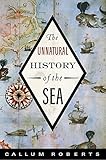The unnatural history of the sea Callum Roberts
Tipo de material: TextoIdioma: Inglés Detalles de publicación: Washington, DC Island Press A Shearwater Books c2007Descripción: xvii, 435 páginas fotografías, mapas, retratos 23 centímetrosISBN:
TextoIdioma: Inglés Detalles de publicación: Washington, DC Island Press A Shearwater Books c2007Descripción: xvii, 435 páginas fotografías, mapas, retratos 23 centímetrosISBN: - 1597265772
- 9781597265775
- 909.09 R6
- Disponible en línea
Incluye notas: páginas 379-421 e índice: páginas 423-435
Preface.. Part One. Explorers and Exploiters in the Age of Plenty.. Chapter 1. The End of Innocence.. Chapter 2. The Origins of Intensive Fishing.. Chapter 3. Newfound Lands.. Chapter 4. More Fish than Water.. Chapter 5. Plunder of the Caribbean.. Chapter 6. The Age of Merchant Adventurers.. Chapter 7. Whaling: The First Global Industry.. Chapter 8. To the Ends of the Earth for Seals.. Chapter 9. The Great Fisheries of Europe.. Chapter 10. The First Trawling Revolution.. Chapter 11. The Dawn of Industrial Fishing.. Part Two. The Modern Era of Industrial Fishing.. Chapter 12. The Inexhaustible Sea.. Chapter 13. The Legacy of Whaling.. Chapter 14. Emptying European Seas.. Chapter 15. The Downfall of King Cod.. Chapter 16. Slow Death of an Estuary: Chesapeake Bay.. Chapter 17. The Collapse of Coral.. Chapter 18. Shifting Baselines.. Chapter 19. Ghost Habitats.. Chapter 20. Hunting on the High Plains of the Open Sea.. Chapter 21. Violating the Last Great Wilderness.. Chapter 22. No Place Left to Hide.. Part Three. The Once and Future Ocean.. Chapter 23. Barbequed Jellyfish or Swordfish Steak?.. Chapter 24. Reinventing Fishery Management.. Chapter 25. The Return of Abundance.. Chapter 26. The Future of Fish.. Notes.. Index
Disponible para usuarios de ECOSUR con su clave de acceso
Humanity can make short work of the oceans'creatures. In 1741, hungry explorers discovered herds of Steller's sea cow in the Bering Strait, and in less than thirty years, the amiable beast had been harpooned into extinction. It's a classic story, but a key fact is often omitted. Bering Island was the last redoubt of a species that had been decimated by hunting and habitat loss years before the explorers set sail. As Callum M. Roberts reveals in The Unnatural History of the Sea, the oceans'bounty didn't disappear overnight. While today's fishing industry is ruthlessly efficient, intense exploitation began not in the modern era, or even with the dawn of industrialization, but in the eleventh century in medieval Europe. Roberts explores this long and colorful history of commercial fishing, taking readers around the world and through the centuries to witness the transformation of the seas. Drawing on firsthand accounts of early explorers, pirates, merchants, fishers, and travelers, the book recreates the oceans of the past: waters teeming with whales, sea lions, sea otters, turtles, and giant fish. The abundance of marine life described by fifteenth century seafarers is almost unimaginable today, but Roberts both brings it alive and artfully traces its depletion. Collapsing fisheries, he shows, are simply the latest chapter in a long history of unfettered commercialization of the seas. The story does not end with an empty ocean. Instead, Roberts describes how we might restore the splendor and prosperity of the seas through smarter management of our resources and some simple restraint. From the coasts of Florida to New Zealand, marine reserves have fostered spectacular recovery of plants and animals to levels not seen in a century. They prove that history need not repeat itself: we can leave the oceans richer than we found them. Inglés
Disponible en línea
Disponible en formato PDF


